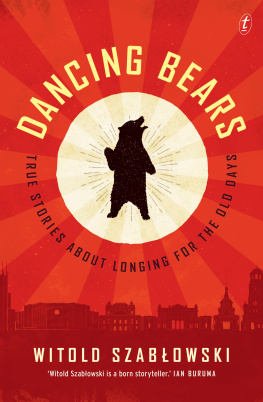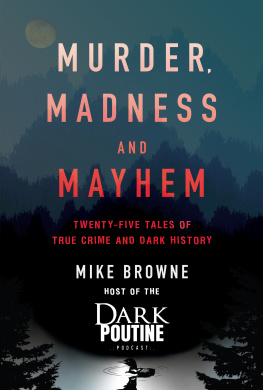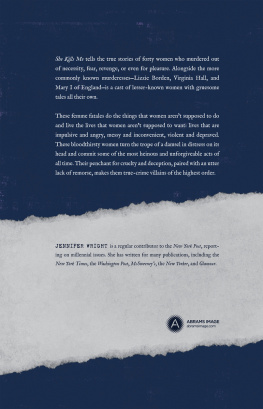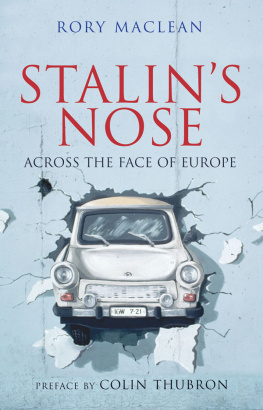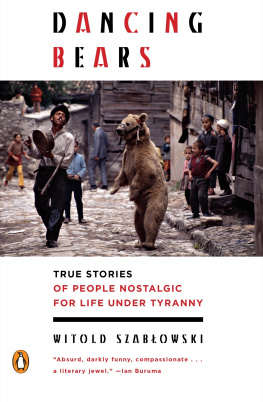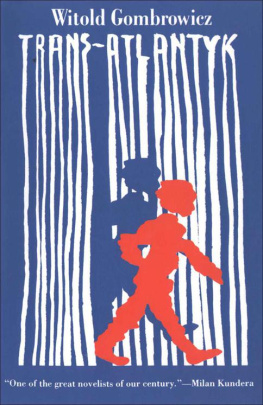FOR HUNDREDS OF YEARS, Bulgarian Gypsies trained bears to dance, welcoming them into their families and taking them on the road to perform. In the early 2000s, after the fall of communism, they were forced to release the bears into a wildlife refuge. But, even today, whenever the bears see a human, they still get up on their hind legs to dance.
In the tradition of Ryszard Kapuscinski, award-winning Polish journalist Witold Szablowski takes us from eastern Europe to London, Greece and Cuba, uncovering the stories of people whose lives havent quite caught up with their countries political turns: the families who mourn for the days they raised bears alongside their children; the women who take care of Stalins childhood home in Georgia; the villagers who turned their homes into hobbit holes for tourism in Poland.
Humorous and heartbreaking in equal measure, Dancing Bears reminds us how journalism can change the way we see the world, the way we think and feel about people and things.
One of the truest and most beautiful things Ive read.
TIM FLANNERY
CONTENTS
Some of the names in this book have been changed to protect the privacy of individuals.
Athens: Every day thousands of Greeks here dream that one day their country will finally be run by the best and happiest system: Communism.
Belgrade: For many years war criminal Radovan Karadi was here in hiding, disguised as a doctor of alternative medicine.
Berat: Here a construction worker, Djoni, smashes up the bunkers built by Enver Hoxha.
Gori: Here, in the house where Stalin was born, the generalissimos death mask is guarded by his vestal virgins.
Havana: Thousands of Cubans tremble as they hear reports about the declining health of Fidel Castro, some in horror, others in hope that the winds of change will finally start to blow on their island too.
London: Lady Perons five acres are located here, between the Victoria railway and coach stations.
Kosovska Mitrovica: Good friends Florent and Duan set off from here to distribute chickens to the Serbs who come home to Kosovo.
Medyka: Day in and day out, thousands of ants walk across the Ukraine border here, bringing vodka and cigarettes into Poland.
Narva: The capital of the Estonian Russians, where not even the police can speak Estonian.
Sierakowo Sawieskie: In the fight against poverty, the former residents of a state farm that was located here have founded the Hobbits Village. They dress up as figures out of Tolkien and invite kids to take part in field games.
Tirana: Enver Hoxha ruled Albania from here, where theres still a pyramid designed in his memory by his daughter and son-in-law.

Belitsa: This town is the site of the thirty-acre Dancing Bears Park, where the bears are taught to live in freedom.
Dryanovets: This is the home of brothers Gyorgy and Stefan Marinov. Gyorgy used to travel the Black Sea coast and the local fairs with his female bear, Vela. Stefan was an expert in the extremely difficult art of wrestling with a bear.
Getsovo: Here, in 2007, the last three dancing bears in BulgariaMisho, Svetla, and Mimawere taken away from the Stanev family.
Yagoda: A town whose bear keepers were famous, though poorer than their colleagues in the north of the country. The Bulgarians used to say with a sneer that every resident of Yagoda had a bear at home.
Loznitsa: This village was the birthplace of Pencho Kubadinski, who hid with Gypsy bear keepers during the Second World War and later became one of the best known Bulgarian Communistsa close friend and colleague of Todor Zhivkov.
Sofia: Here in the capital city, only a few years ago, you could still see bear keepers in trams, at housing developments, and even outside stores or lottery-ticket sales outlets. They played the gadulkaa traditional string instrumentand begged for handouts.
Varna, Golden Sands: Not many years ago, before Bulgaria joined the European Union, the most popular Bulgarian resorts were still full of bear keepers and their animals.
The guy with the wacky hair and the crazed look in his eyes did not appear out of nowhere. He was already known to them. Sometimes he said how great they were, and told them to go back to their roots; if need be, he threw in some highly unlikely but madly alluring conspiracy theory. Just to get them to listen. And to give them a fright. Because hed noticed that if he scared them, they paid him more attention.
Theyd gotten used to him being there, and to the fact that now and then, with a totally straight face, he said something unintentionally hilarious. Sometimes he hovered on the fringes of political life, sometimes closer to the mainstream, but he was generally regarded as a mild eccentric.
Until one fine day they rubbed their eyes in amazement. Because the guy with the wacky hair had entered the race for one of the highest offices in the land. And just as before, here he was, trying to scare them againwith talk of refugees, war, and unprecedented disaster. With anything at all. He was also trying to pump up the national ego. In the processin the eyes of the so-called elitehe was making a bit of a fool of himself. But he was also making big promises. Above all, he promised to turn back time, and make things the way they used to be. In other words, better.
And he won.
You know where this happened? Yes, youre right. In our part of the world. In post-communist Central and Eastern Europe. In Regime-Change Land.
Regime-Change Land is the lava that began to pour from the volcano known as the Soviet Union and its satellites shortly before it erupted and ceased to exist. Our part of the world did of course have an earlier existencethe Poles, Serbs, Hungarians, and Czechs, for example, have long histories. But since World War II we had been living in the Soviet sphere of influence, put on ice by the agreements concluded at Yalta by Stalin, Roosevelt, and Churchill, which had left us on the dark side of the balance of power.
The lava began to flow in Poland on June 4, 1989, when the first (almost) free elections were held.
Then the Berlin Wall came down. And the lava really began to flow.
Soon after that, the Soviet Union came apart, and so did the whole post-Yalta order.
We became free. Not just the Poles, Serbs, Hungarians, and Czechs, but also the Estonians, Lithuanians, Ukrainians, Bulgarians, Kirghiz, Tajiks, Kazakhs, and others. A large part of the world gained freedom, for which it was not prepared. In the most extreme cases it wasnt expecting or even wanting it.
The story of the dancing bears was first told to me by Krasimir Krumov, a Bulgarian journalist I met in Warsaw.
For years on end, he said, these bears had been trained to dance, and had been treated very cruelly. Their owners kept them at home. They taught them to dance by beating them when they were small. They knocked out their teeth, to make sure the bears would never suddenly remember they were stronger than their keepers. They broke the animals spirits. They got them drunk on alcoholmany of the bears were hooked on strong drink forever after. And then they made them perform tricks for touristsdancing, imitating various celebrities, and giving massages.
Then, in 2007, when Bulgaria joined the European Union, the keeping of bears was outlawed. An Austrian organization called Four Paws opened a special park in a place called Belitsa, not far from Sofia, and the bears were taken from their keepers and relocated there. Gone was the whip, the brutality, the nose ring thataccording to the people from Four Pawssymbolized the bears captivity. A unique project began: to teach freedom to animals that had never been free. Step by step. Little by little. Cautiously.

